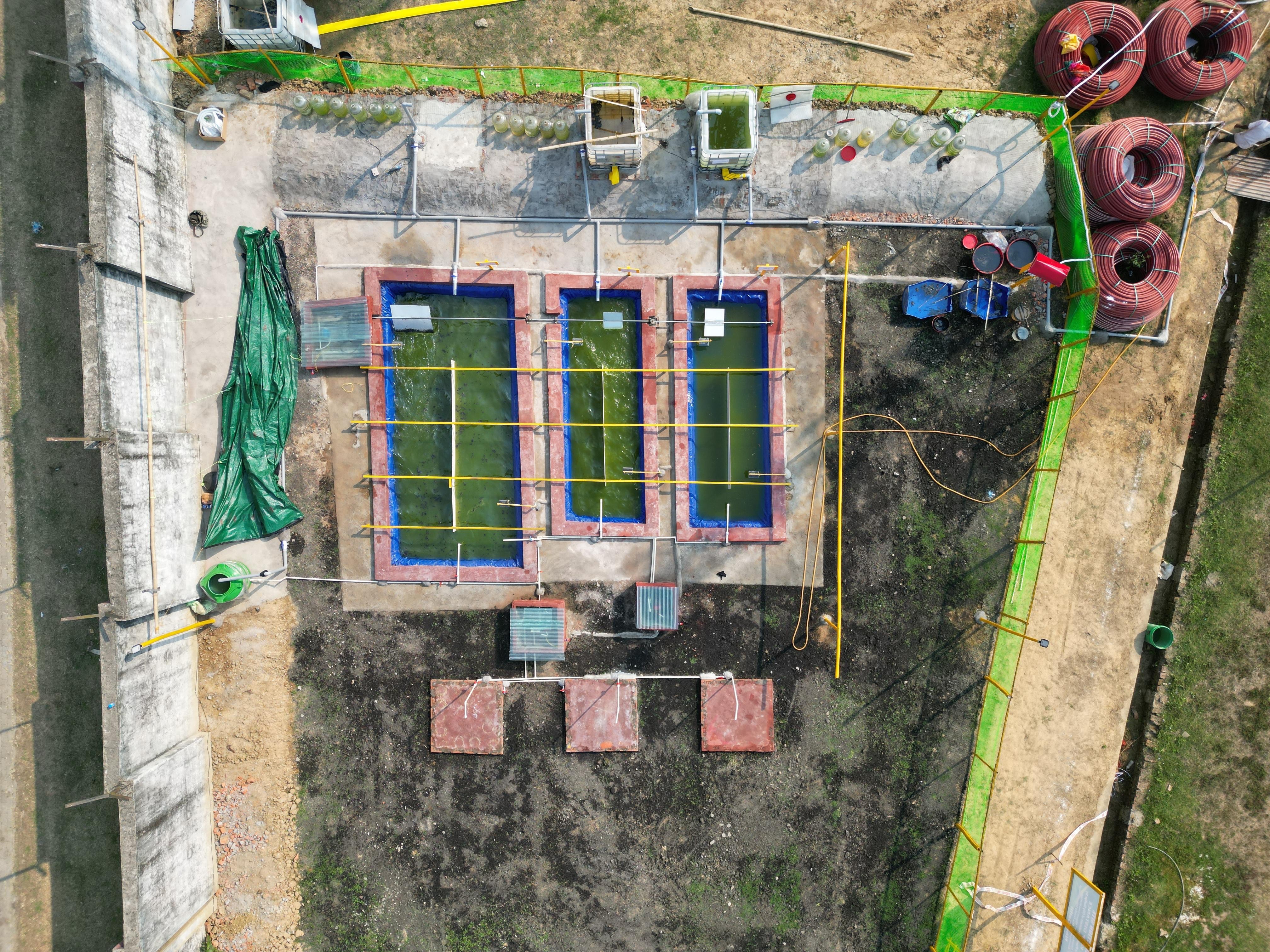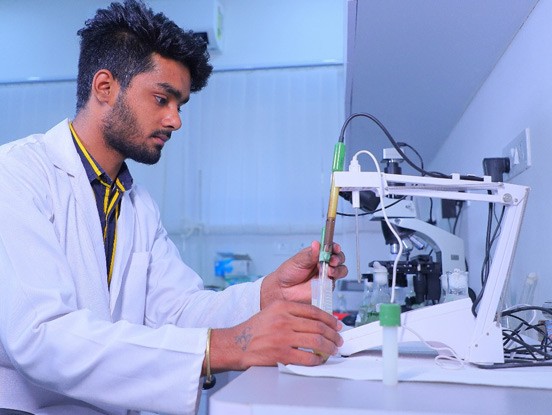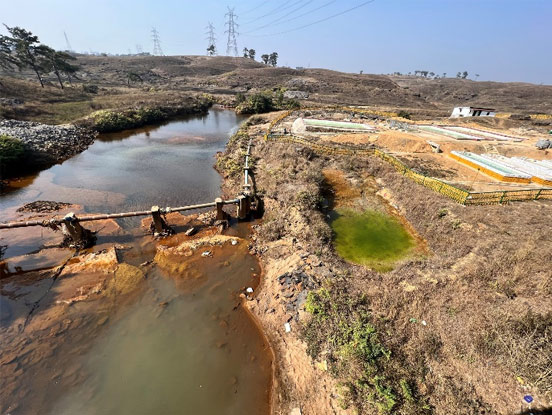
Our Technology - Phycoremediation 
“Nature has been using Algae for cleaning water and sustaining bio-life for millions of years by creating natural food chain. Almost the entire oxygen in water, be it in sea, oceans or rivers, is only because of algae”
Algae are photosynthetic organisms found in a wide range of aquatic environments. As native species, algae can provide several benefits to their ecosystems, including:
![]() Water quality: Algae can help to improve water quality by absorbing excess nutrients and reducing the growth of harmful bacteria.
Water quality: Algae can help to improve water quality by absorbing excess nutrients and reducing the growth of harmful bacteria.
![]() Carbon sequestration: Algae can also play a role in carbon sequestration, by capturing and storing carbon dioxide from the atmosphere.
Carbon sequestration: Algae can also play a role in carbon sequestration, by capturing and storing carbon dioxide from the atmosphere.
![]() Nutrient cycling: Algae play an important role in cycling nutrients like nitrogen and phosphorus, essential for the growth of aquatic plants and other organisms.
Nutrient cycling: Algae play an important role in cycling nutrients like nitrogen and phosphorus, essential for the growth of aquatic plants and other organisms.
![]() Oxygen production: Algae produce large amounts of oxygen through photosynthesis, which is essential for the survival of other aquatic organisms.
Oxygen production: Algae produce large amounts of oxygen through photosynthesis, which is essential for the survival of other aquatic organisms.
![]() Food source: Algae can be a food source for many aquatics like fishes and other animals,
Food source: Algae can be a food source for many aquatics like fishes and other animals,
Overall, as native species, algae are an important part of aquatic ecosystems and provide several benefits to the environment and other organisms.
 Our technology generates a circular economy
Our technology generates a circular economy There is a hugely positive ecological impact
There is a hugely positive ecological impact
Waste Water Treatment
Water is an essential element of life; no life form can survive without it. However, billions of people in the world lack access to this basic commodity and are thus caught in the cycle of thirst. Unprecedented population growth and associated urbanization, accelerated industrialization and economic development have further escalated the problem by generating tonnes of wastewater thereby increasing the pollution load. This untreated wastewater not only is a menace to the environment but is also a potential source of many water-borne diseases such as diarrhoea, cholera, and typhoid.
Algae again come to our rescue against this mounting impediment towards global wellbeing. Algae, by their inherent process of producing oxygen by photosynthesis, can break down organic pollutants and adsorb the metal contaminants as well. This is a sustainable and affordable process that has the potential to solve the growing problem of clean and potable water availability to the masses and therefore aligns with UN SDGs.
At Trinity, we have developed a variety of algal consortia that can remove organic pollutants from water bodies. Using the consortia and lab-developed strategies, we have successfully treated a wide range of wastewater from highly acidic industrial effluents, municipal wastes as well as natural water bodies such as rivers, ponds, and lakes with high organic load to levels with permissible range.





Industrial effluent treatment
Microalgal phycoremediation is an innovative, eco-friendly technology for industrial
wastewater treatment, offering sustainable solutions for a wide range of effluents such as
oily sludge, tannery wastewater, electroplating discharges, and food and beverage
industry effluents.
This green treatment process uses specially cultivated microalgae to absorb, degrade, and
transform pollutants. In oily sludge remediation, microalgae break down hydrocarbons and
assist in heavy metal removal, while producing oxygen to enhance biological activity.
Tannery effluents high in chromium and sulfide are detoxified using metal-resistant algal
strains.
Electroplating effluents, containing toxic metals like cadmium, nickel, and lead, are
efficiently treated through algal biosorption and bioaccumulation, ensuring environmentally
safe disposal. In the food and beverage sector, effluents rich in organic load, nitrogen, and
phosphorus are ideal for nutrient recovery through high-rate algal systems.
Phycoremediation offers dual benefits—effluent purification and biomass generation. The
resulting algal biomass can be converted into biofertilizer, biofuel, or bioplastics, enabling a
circular economy. Technologies such as high-rate algal ponds and photobioreactors ensure
scalability and cost-effectiveness.
This nature-based treatment solution supports carbon sequestration, wastewater reuse,
and ESG compliance, making it ideal for industries seeking sustainable and regulatory-
compliant wastewater management.





CO2 Sequestration
The importance of Oxygen on the planet is paramount for humankind, without it, we wouldn’t be here. Every year, tonnes of carbon dioxide are released into the atmosphere due to human activities such as the burning of fossil fuels, Industrial activities, and to some extent of constant deforestation. In addition to causing global warming, excess level of carbon dioxide also leads to severe health problems. Other than controlling the release of CO2, one of reducing atmospheric CO2 is to capture or “sequester” it.
It's no surprise, the fallback position for the world in its fight against climate change has gone back to the magical tiny organisms which were initially responsible for generating Oxygen on planet Earth. Let’s welcome back Algae, the all-powerful tiny biochemical factories. Algae are capable of capturing carbon dioxide (CO2) from the atmosphere and converting it into organic matter through photosynthesis and have been doing it for billions of years. They are responsible for over 70% of Oxygen on the wonderful planet we call home. This process is known as carbon dioxide sequestration, and it can help very effectively mitigate the effects of climate change by reducing the amount of CO2 in the atmosphere.
At Trinity, we utilize this exact key feature of algae to capture obnoxious and toxic flue gasses through indigenously built photobioreactors thus contributing to the environment and healing mother nature. Let’s discuss how we all can contribute to a better and cleaner environment.





Biomining/Leachate Treatment By Algae
Landfilling of municipal wastes is the oldest, cheapest, and most common alternative for waste disposal, but mismanaged landfilling sites create significant environmental nuisances in the longer run. Landfills contaminate the environment by producing toxic leachate which harms the ecosystem and food chains leading to carcinogenic effects, acute toxicity, and genotoxicity among human beings. Pollution control for leachate is a global issue and still a big challenge in source reduction and pollutant removal.
Trinity International has developed a sustainable waste management strategy by treating leachate with algae at existing landfills by remediating low-quality water for recycling and reuse and generating large amounts of algal biomass for the cost-effective manufacturing of biofuels and bioproducts.
In addition, we have also developed a cost-effective and simple process of bio-mining technology using algae for the treatment of legacy waste for the reclamation of wasteland. This ensures the reclamation of dumpsite land and clearance of old waste in a scientific and environmentally friendly manner.
Do connect with us if you further want to know how we manage the highly toxic leachate within specific regulations by authorities to ensure minimal environmental impact.





Research At Trinity
Research is to see what everybody else has seen, and to think what nobody else has thought.” Our constant endeavour at Trinity is to improvise on what we have already built. The state-of-the-art research lab at Trinity International, equipped with modern instruments and trained scientists works diligently to carry out cutting-edge research in the area of developing algal-based environmental solutions. A result of our efforts is an indigenously built photobioreactor to sequester carbon dioxide which operates completely on solar power and can be scaled up to be installed on traffic signals or scaled down as an air purifier adding aesthetic value to office spaces or homes.
Further, our lab is developing novel solutions to address the present-day real-world problems of environmental pollution on a large scale. Our research efforts are directed toward realizing a sustainable and realistic resolution for reclaiming the otherwise contaminated natural resources of air, water, and soil.
We are open to research collaborations and we are currently in collaboration with IIT-Delhi and AIIMS Delhi for a research project.
Please drop a message if you wish to collaborate and we welcome you to visit our facilities to have an understanding of our work.










